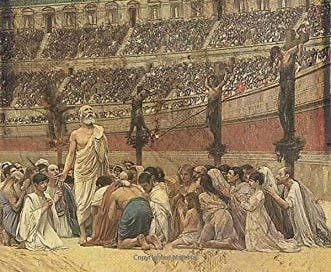If you are looking for the beginning of the study for Eusebius’ Church History then you can go HERE for a brief introduction. At the bottom of the introduction you will find the links to each section of the study guide as it becomes available. If you would like to see the growing list of book studies available for free on this site you can go HERE. Enjoy!
Virtues/Vices/Great Ideas: (Find them in the Text)
Providence, Light vs. Darkness, Freedom vs. Bondage, Despotism, Justice, Compassion
Grammar Questions: (The Information of the Text)
Who was chosen to replace Judas as an apostle after his betrayal of Jesus?
What did Eusebius say that James (the Lord’s brother) was “elected” to be?
According to Eusebius, for what had Simon Magus famous and what had people believed concerning him?
According to Eusebius what did Emperor Tiberius attempt to do which the Roman Senate dismissed?
Who is Philo and under what circumstances did he almost lose his life?
What did Gaius Caligula attempt to do to the Jewish temple in Jerusalem?
According to Eusebius, to what end did Pontius Pilate come?
What crimes against the church did Herod Agrippa commit during the reign of Claudius as Emperor of Rome?
What, according to Eusebius, made the people call Herod Agrippa a god?
What had Theudas boasted and what became of him?
What foreign monarch showed mercy on the people of Judea during a great famine?
Logic Questions: (Interpreting, Comparing/Contrasting, Reasoning)
Given the above definition of the term “bishop,” why might it have been necessary to elect someone to serve in that capacity in first century Jerusalem?
What does it mean to say that Simon Magus was “believed to be the Great Power of God”?
What did Tertullian mean when he wrote “so man must have mercy on god in your system”?
What does Eusebius mean when he refers to “divine justice”? How is that distinct from regular justice?
Rhetoric Questions: (The Analysis of Ideas in the Text)
Do you think the fact that Tiberius put Jesus before the Romans senate to be considered as a god means that he became a Christian? Why or why not?
Philo is said to be “an authority on Plato and Pythagoras.” What does it mean to be “an authority” on something or someone? How does one become an authority in this sense? Should we desire to become an authority on something? If so, what kind of things? If not, why not?
Theological Analysis: (Sola Scriptura)
Read Acts 5:33-42. How does Josephus’ account concerning Theudas complement and add detail to the biblical record concerning this man?



